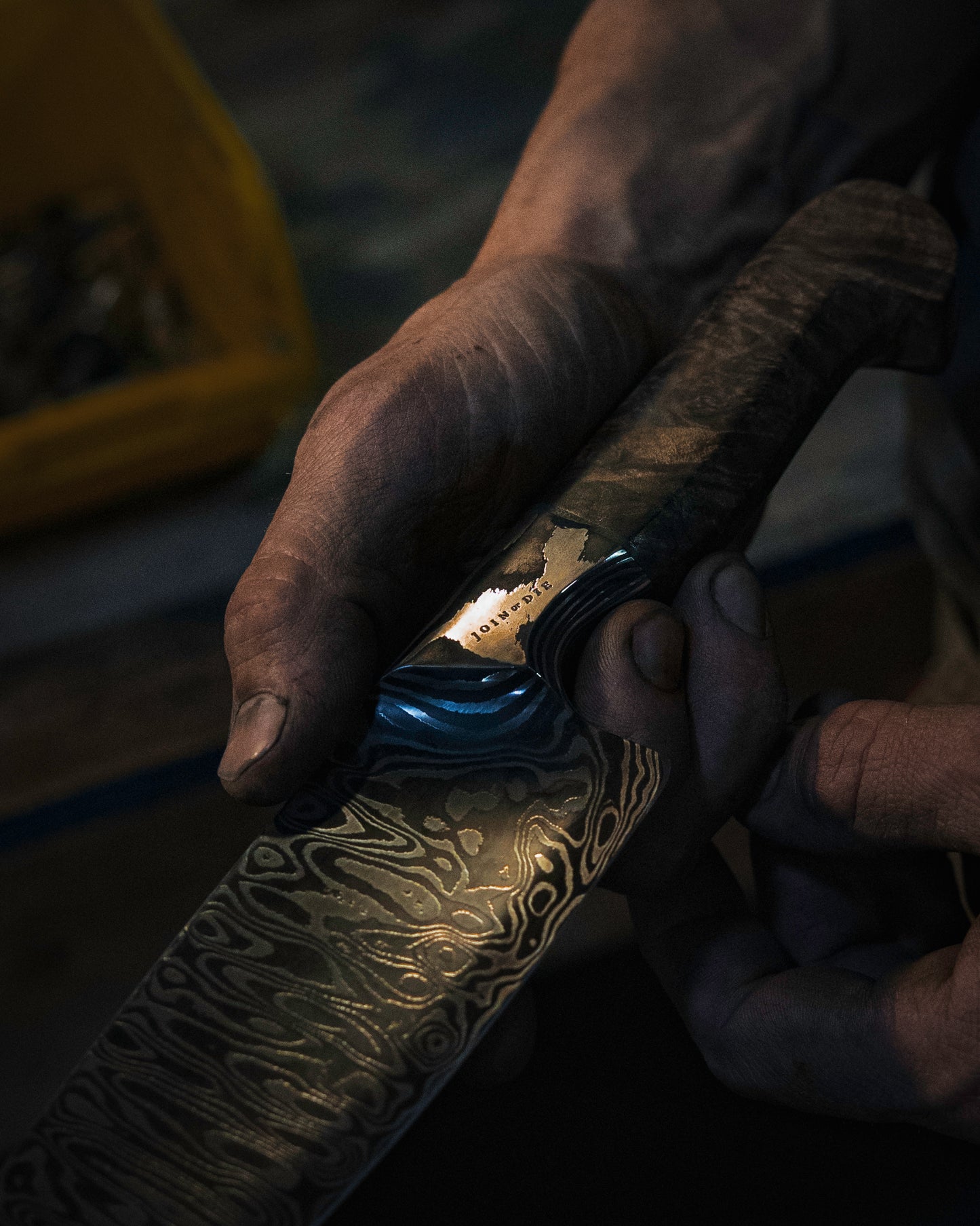
My question is: Does "random" in this (or any) context describe a verifiable condition or a limit of perception?
My answer is: It describes a limit of perception. This is, of course, not a scientist's answer, but it may be that anybody's answer would be unscientific. My answer is based on the belief that pattern is verifiable by limited information, whereas the information required to verify randomness is unlimited. What is perceived, as random within a given limit, may be seen as part of a pattern within a wider limit." -Wendell Berry, Home Economics
Random pattern Damascus is not random at all, it is too difficult for us to keep track of the ways that we manipulate the steel in order to produce the pattern. Even when we produce a Damascus pattern which we intentionally build into the design, there are all kinds of “random” distortions that happen. This just means that as we manipulate the steel, chain reactions in the layers take place based on the way we strike or press the material. Heat differences across the material have a variable effect on the ductility along with subtle differences in the alloy movement. We are taking part in a process that we view ourselves as in control of, but are in fact only partially in control of. It’s like spraying a garden hose onto the lawn and trying to understand where each drop of water will fall. Of course, we know the general direction of the water stream, but the particulars escape us.
Again from Berry:
“The error of the purely empirical way of understanding is ascribing randomness to systems just because we don’t understand them. We would be wise to refer to this so-called randomness as mystery or natural. This brings us to the problem of nature itself. We often think of nature as something separate from the human experience but we are part of nature, and as we live in it, we change it. All natural creatures change their environment as they live in it, therefore the changes taking place in nature are actually what make the reality of nature itself. What we call nature is the sum of the changes made by all the various creatures and natural forces in their intricate actions and influences upon each other, and upon their place.”
In the same way, that we find ourselves in a compromise between raw nature and human order, we find ourselves in balance between control and randomness in our pattern making. The novice spends years developing the craft and learning the rules in order to not break but transcend those rules. Another way to put that is that one must spend years learning control over one's craft in order to identify and embrace the natural or the mysterious in a meaningful way. Too much nature without order leaves us starving and freezing in the wilderness while too much order leaves us institutionalized.
But anyway, back to Damascus. I like to call mine a natural pattern, not random. I joke that it is random when everyone else makes it but natural when I make it. It’s really the same difference but the way we describe our process can be important. Every hammer blow leaves another ripple in the pattern. How much we grind into the blade - perhaps chasing an inclusion in the steel - affects the final outcome. Many see the pattern of a fingerprint in laminated steel and in a way each piece truly does have its own unique print. The beauty of this is that just like humans, each unique one also shares most attributes with others like it. If I make a 120 layer Damascus, the layer density will be recognizable as such but not exactly like other blades, even ones made from the same bar stock.
As we advance in any craft, experience teaches us what to expect later from what we are doing now. This helps us understand just a bit more about the process, turning what once seemed random into a familiar technique. There are many techniques that are still mysterious to me and that is my favorite thing about this craft. This is also why I enjoy teaching others. Sharing something that has become a very simple and every day technique with someone who has never seen it can really change their game. I have had many experiences where another craftsman’s off hand comment has led to a breakthrough for me and I hope I’ve been able to do that for others.